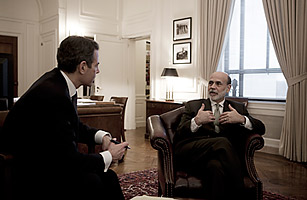
TIME's Managing Editor Richard Stengel talks with Federal Reserve Chairman Ben Bernanke during an interview in Washington, DC
(4 of 12)
No, it was comprehensive, and it was succinct considering the scale of it. I'm gripped by this meeting in October with the ministers of the industrialized nations. And it makes me want to ask, here you are in this job where you're under tremendous domestic political pressure all the time, this week being a pretty good example. But in your real job, when you're really trying to do what you outlined as your goal, can you explain to us where the role of the U.S. really fits into the rest of the world in this particular crisis, and going forward? And how much of your job involves dealing with the rest of the world, and their ministers? And when you talk about regulating the environment better, and getting better controls, how much of that is possible in a globalized economy? In other words, how much of what you can do, and we can do, can be effective in that arena?
Well, the U.S., of course, is the world's largest economy. It's about a quarter of the world's output. It's also home to many of the largest financial institutions and financial markets. With that being said, as you pointed out, we're only part of a global system. You know, economically, we are interdependent with our trading partners in Europe and Asia, for example, and many other countries in Europe, continental Europe, U.K., others, Japan also have large financial institutions. And we have, as you know, a globalized financial system, where transactions can speed around the world at the speed of light. And financial markets and institutions are integrated across borders in a very intimate way.
So, what this means is that economic policy, and financial oversight have to take into account all the international dimensions of that. So, for example, on the monetary policy side, we have worked carefully and closely with other central banks to talk about monetary policy in different parts of the world. In fact, during the heat of the crisis in October 2008, the Federal Reserve and five other major central banks cut interest rates together on the same day, as a sign of how committed we were to cooperating on monetary policy.
It's much more regular and consistent for us to cooperate on financial oversight, because of the fact that our financial markets are so global. And the financial institutions are multinationals with subsidiaries in many, many different countries. So, we work closely with other countries in overseeing these firms.
Typically, a bank which has its headquarters in the U.S. will be — the primary overseer will be a U.S. regulator, but we will also coordinate, cooperate, with the regulators in the countries where that bank or financial institution operates. So, we coordinate very closely in that respect. And we also coordinate in terms of regulatory policy.
There are a number of institutions globally where the Federal Reserve typically leads the U.S. effort to work with financial regulators from other countries, and we try to, to the extent possible, establish international standards for how — the amount of capital a bank should hold, for example, or how much.
So, except for the issues of self-interest, you're saying there is some consensus in this.
There is consensus. Indeed, there's quite a bit of cooperation and working together, both at the level of central banks, which work together very closely, and finance ministries. And, recently, we've seen cooperation even to the level of Presidents and Prime Ministers, you know, in the G20 meetings that we've had.
So, on a personal level, to what extent do you go that October meeting saying, they're all looking at me. And you're the man.
Well, Secretary Paulson and I represented the U.S. in that meeting. And we certainly wanted to provide some leadership, but we had representatives of seven major industrial countries there — the U.S., Canada, Japan, U.K., France, Italy, Germany. I think that's it.
Is there much finger-pointing in a session like this, you caused it, you fix it?
Our main concern was, what are we going to do together collectively to prevent this global financial meltdown? We understood that, given the international nature of the crisis, and the way money flows across borders so quickly, and the fact that the institutions and the markets themselves were transnational, that only a strong cooperative effort would restore the confidence in the financial markets, and stabilize the situation. And, indeed, while it wasn't — we didn't literally move at exactly the same time, and in exactly the same way — but there was a remarkable amount of coordination between the U.S. and other major industrial countries.
The system worked.
It did work. It was an important first step. I mean, even after we took those steps, the financial markets were in a great deal of stress, and credit at all levels was very much constrained. But it stabilized the situation, and from there, we were able to take a number of steps to — both we, and our partners in other countries — to get the key markets working again, to get the banks stabilized, and to begin the very difficult process of getting the financial system back on its feet.